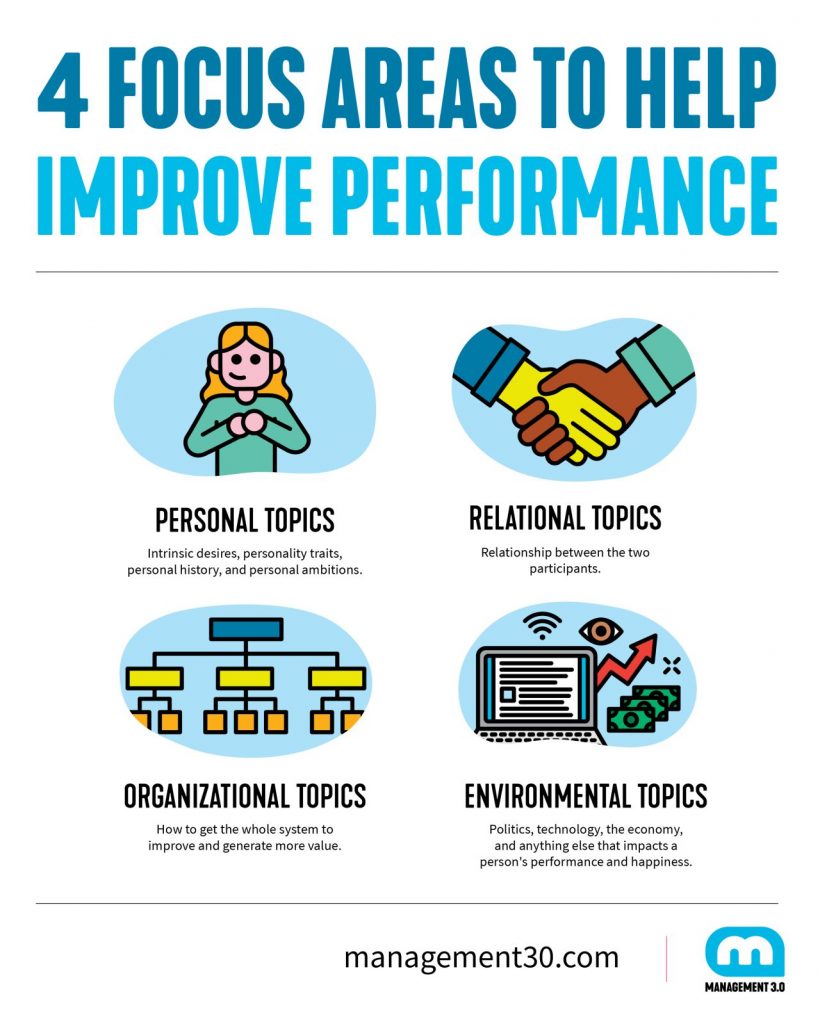Do you want your next 1-on-1 to be even more effective?
Here’s how:
Instead of traditional coaching questions, use inquisitive statements!
Inquisitive statements turn questions into statements.
At Management 3.0, we call this method Improvement Dialogue.
And we have a game for download containing 160 statements from four areas of inquisitive statements: personal, relational, organizational, and environmental.
All statements are designed to be powerful by implicitly using
• why,
• how,
• what, and
• when (hidden within the statements).
These question words invite deeper discussions, many of which help people bring their underlying assumptions to the surface.
Personal coaching, one-on-ones, and pair working are three examples of people helping employees and colleagues learn how to do better work. Using inquisitive statements instead of traditional coaching questions, you can improve a person’s performance using principles taken from Appreciative Inquiry, Powerful Questions, and Improvisational Theater.
- Personal Topics, one of the goals of one-on-one coaching sessions is to align work and outcomes with a person’s motivations. You can use your quality time to discuss intrinsic desires, personality traits, personal history, and personal ambitions.
- Relational Topics, a second area to cover in one-on-one coaching is the relationship between the two participants. You’re trying to achieve a good working relationship. Therefore, any issues that are impeding a healthy and productive collaboration need to be resolved.
- Organizational Topics, you should also talk about organizational changes and news, team performance, organizational structure, upcoming opportunities, innovative capability, and how to help other team members succeed. You’re there to discuss how to get the whole system to improve and generate more value.
- Environmental Topics, the last area in one-on-one coaching is a conversation about the environment. You can talk about politics, technology, the economy, and anything else that impacts a person’s performance and happiness.
You can decide not to use one area when it does not apply to your situation and adjust the inquiry scope to what is realistic and actionable.
How to get started with an improvement dialogue
This is what you can do to get started with improvement dialogues:
- Initiate coaching, pairing, one-on-one, or copilot session.
- Invite your colleague, friend, coach, or copilot for a private talk in a comfortable environment (preferably not in a dull office).
- Print the statements in a way that makes it easy to pick at random. Leave out the areas that do not apply to your situation.
- Explain the rules: no questions allowed, only reply in the affirmative, and contribute to the dialogue.
- Pick questions, develop your conversations, and support each other’s contributions.
- Make notes of any insights and action items.
- Evaluate. Yes, you are now allowed to disagree and ask questions.
Let’s quickly experiment with an improvement dialogue
The idea of an improvement dialogue is that a person picks a random statement from the list (or draws it from a pile of cards) and completes the sentence in any way she likes. Here is an example, with the statement: “What I need most is:..”:
- “What I need most is… a bit more time to learn new tools and technologies.”
The coach, manager, pairing partner, or copilot now should respond to that statement in the affirmative and suggest bringing the dialogue forward.
- “OK, perhaps we can find out what busy work is keeping you from learning new things.”
It is then up to both participants to keep the conversation flowing by always staying optimistic and contributing to the previous statement.
- “Yes, I have a hunch that management’s daily interruptions are costing me too much time.”
- “I see. Well, it should not be too difficult to measure this and validate that assumption.”
- “You’re right, and I’ll see if I can find a time tracker app on my smartphone to do this.”
- “Good, and I will check if someone else has done something like that before.”
👉 Download the Improvement Dialogues Cards: https://lnkd.in/dtMqqECf
